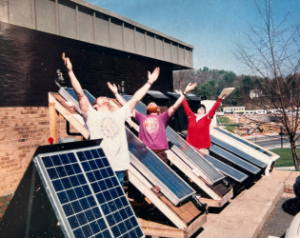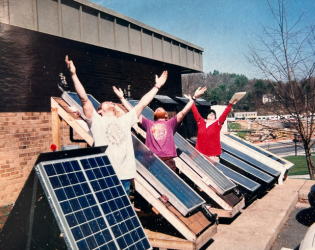The Appropriate Technology Program at Appalachian State University is celebrating its 40th anniversary this year with a 3-day event (July 12-14) featuring alumni panels on sustainability and renewable energy, site tours of active projects around the High Country, and social gatherings for fun and networking. Started in 1984, the Appropriate Technology program has evolved into the Department of Sustainable Technology and the Built Environment with over 800 students whose primary focus is clean energy and efficient buildings.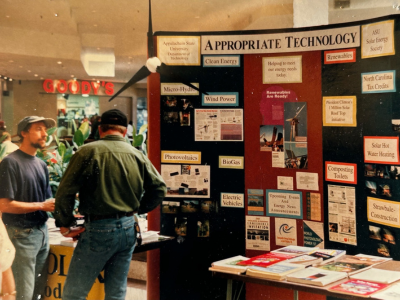 Appropriate Technology Outreach in Boone
Appropriate Technology Outreach in Boone
Appropriate Technology defined as "simple engineering solutions to our everyday problems," came out of the tumultuous 1970s as America and the world witnessed the culmination of decades of industrial-scale pollution, energy shocks and the realizations that "bigger is not always better" and the world was powered by non-renewable resources. This "AT" movement, built on the momentum of the civil rights, back to the land, and environmental movements of the 1960s and earlier, questioned endless growth and industrial consumption of resources to instead focus on human-scale technologies that are environmentally sound, energy efficient, controlled by the local community, and simple enough to be maintained by the people using it. Early efforts focused on solar, water, and wind energy, waste and resource recycling, greenhouse and shelter design and construction, and biodynamic agriculture. In 1977 the National Renewable Energy Lab (NREL) was established under the US Department of Energy, leading to the first federal funding for renewable energy research and development.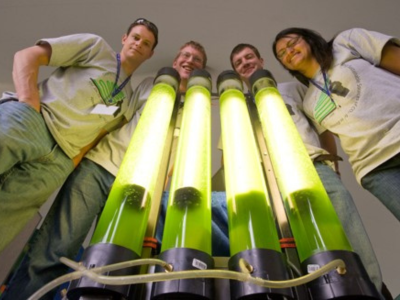 Appropriate Technology Students at EPA P3
Appropriate Technology Students at EPA P3
Back in Boone in 1978, the "Earth Studies Program" housed under Watauga College, was granted a trial period as an experimental general education program whose goal was "to provide students with knowledge and skills to live in an environmentally responsible way." The program was supported by the Valle Crucis Mission School which provided land, a farm house, and a barn for lab activities. Coursework included wind power, solar energy, and biodynamic farming. Disbanded in 1983, Earth Studies provided the foundation for Appropriate Technology as a field of study, and the Department of Sustainable Technology & the Built Environment and the Department of Sustainable Development. 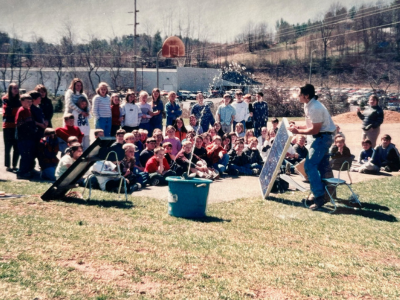 AT Outreach in Local Schools
AT Outreach in Local Schools
Dr. Dennis Scanlin was hired in 1984 to establish the Appropriate Technology program in its new academic home, the Department of Industrial Education and Technology. The "AT" undergraduate and graduate programs were interdisciplinary with focus on renewable energy and community engagement. Dr. Scanlin also founded the Construction Technology Program, which became the Building Sciences program in the 90s. 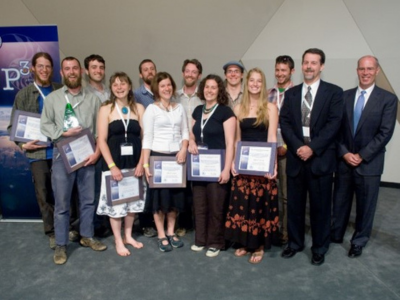 AT Students Win EPA P3 Award
AT Students Win EPA P3 Award
The "AT" program spurred many early sustainability initiatives at AppState including: the first student-led club focused on sustainability (The Solar Energy Society, 1995), the Appalachian Energy Center (2001) whose goal is to create a clean energy future of North Carolina, and the student-led, student-funded Renewable Energy Initiative (2004) to support the installation of renewable projects on campus. Students and faculty from the "AT" and Building Sciences program have also been drivers of high profile projects over the years including: Solar Decathlons, Department of Energy Race to Zero and Solar District Cup, US EPA P3 student design competition, the Biofuels and Biomass Initiative, the Wind Testing facility on Beech Mountain, the Nexus Project, and the Solar Vehicle Team, Team Sunergy.
In 2015, the "AT" undergraduate program was renamed "Sustainable Technology" to better capture its linkage to clean energy. In 2024, the "AT" graduate program was renamed Masters of Science with a concentration in "Renewable Energy Technology."
About the Sustainable Technology and the Built Environment Department
One of seven departments housed in the College of Fine and Applied Arts, the Department of Sustainable Technology and the Built Environment helps students develop the skills needed to design, build and maintain technological systems that will help create a more sustainable world. The STBE program focuses on renewable energy, biofuels, green building, computer modeling, sustainable transportation, sustainable resource management, and sustainable water and wastewater technology. These are some of the world's fastest-growing technological areas, and they hold many new and exciting career opportunities.
About the College of Fine and Applied Arts
Appalachian State University's College of Fine and Applied Arts is a dynamic and innovative group of seven academic departments, bringing together a variety of perspectives, experiences, and real-world education to provide unique opportunities for student success. The college has more than 3,500 undergraduate and graduate majors. Its departments are Applied Design, Art, Communication, Military Science and Leadership, Sustainable Development, Sustainable Technology and the Built Environment, and Theatre and Dance. Learn more at https://faa.appstate.edu.
About Appalachian State University
As the premier public undergraduate institution in the Southeast, Appalachian State University prepares students to lead purposeful lives as global citizens who understand and engage their responsibilities in creating a sustainable future for all. The Appalachian Experience promotes a spirit of inclusion that brings people together in inspiring ways to acquire and create knowledge, to grow holistically, to act with passion and determination, and to embrace diversity and difference. Located in the Blue Ridge Mountains, Appalachian is one of 17 campuses in the University of North Carolina System. Appalachian enrolls nearly 21,000 students, has a low student-to-faculty ratio, and offers more than 150 undergraduate and graduate majors.
